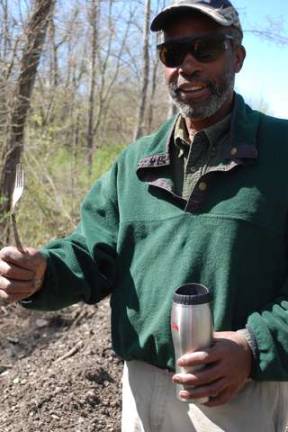From one school’s garbage come the makings of another

A flat screen in the cafeteria at SUNY New Paltz shows green garbage bags tumbling out the back of a garbage truck. It’s not your typical lunchtime entertainment. The video loop is a tutorial on the composting process, from a student putting food scraps in the receptacle marked “composting,” to the mountain of dirt it becomes.
They’re serious here. Since 2009 the college has composted over one million pounds of food. Sodexo, the food service provider that serves 3,700 meals a day to SUNY New Paltz students, has a scale in the kitchen to weigh waste so that it can be reduced. Composting receptacles abound: underneath cutting boards in the kitchen, where the students toss their trays, where the plates are washed in the kitchen. For takeaway food – always the most waste-intensive – there are dispensers of partially plant-based cutlery and cups in the cafeteria, and Sodexo sources similar products for the outside vendors that sell food at the college. So the Starbucks cups look like Starbucks cups, but they’re special.
What happens to the lemon peels and onion skins once they leaves the college, though? That is an education in and of itself.
Three miles away, on an apple farm, an area the size of eight football fields is being prepped. Shabazz Jackson and his wife Josephine Papagni, owners of the composting facility Greenway Environmental Services, have moved a small mountain of finished compost here from their facility at Vassar College. Jackson picks up a bent metal fork from the soil; that’s the only clue that this was once food waste.
They will begin taking in SUNY New Paltz’s food waste here shortly. Using the formulas that Jackson has come up with over 36 years in this industry, they will add it in precise quantities to the finished compost to create highly fertile soil that the apple farmer can use on his trees, lowering the apple farmer’s input of chemical fertilizers.
It could be a beautiful system. So beautiful that Jackson’s vision is to turn this method, once he’s perfected it, into a replicable model of a hyper-local composting facility, designed to serve between four and six square miles.
But that’s not all. Just as he did at Vassar, he hopes to work with SUNY New Paltz environmental studies students, who are already required to do field study. The US Composting Council says that you need, in addition to passing a test, a year of experience and a college degree to become a certified operator of a composting facility. Jackson wants to get college students that experience while they’re in school, so that they’ll graduate ready to start composting facilities of their own.